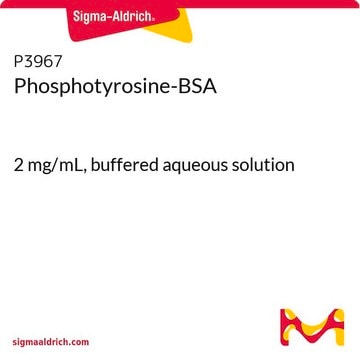P3717
Phosphoserine-BSA
2 mg/mL, buffered aqueous solution
Synonyme(s) :
Phosphoserine Antibody Inhibitor
Se connecterpour consulter vos tarifs contractuels et ceux de votre entreprise/organisme
About This Item
Produits recommandés
Stérilité
non-sterile
Niveau de qualité
Forme
buffered aqueous solution
Concentration
2 mg/mL
Conditions d'expédition
dry ice
Température de stockage
−20°C
Catégories apparentées
Description générale
The activity of proteins depends on phosphorylation of specific amino acid residues. In applications involving identification of activated cellular proteins, it is important to confirm specificity of antibodies used against a particular phosphorylated amino acid. For such applications, inhibitors of phosphorylated antibodies on specific amino acid residues are suitable. Phosphoserine antibody inhibitor may be used for the specific inhibition of the reactivity of anti-phosphoserine antibodies but not that of anti-phosphothreonine- or anti-phosphotyrosine-specific antibodies.
Spécificité
O-phospho-L-serine conjugated to bovine serum albumin. Phosphoserine antibody inhibitor specifically blocks the reactivity of anti-phosphoserine antibody. It does not block the activity of anti-phosphothreonine or anti-phosphotyrosine-specific antibodies. The product is useful in immunoblotting and in ELISA.
Working dilution is at least 2 μg/ml by the specific inhibition of the reactivity of Monoclonal Anti-Phosphoserine (Sigma Product No. P3430), used in immunoblotting of rat cerebral cortex extract, and in ELISA.
Working dilution is at least 2 μg/ml by the specific inhibition of the reactivity of Monoclonal Anti-Phosphoserine (Sigma Product No. P3430), used in immunoblotting of rat cerebral cortex extract, and in ELISA.
Application
Phosphoserine-BSA may be used for specific inhibition of monoclonal anti-phosphoserine (Sigma Product No. P3430) in immunoblotting and ELISA applications, at a working dilution of 2 μg/mL.
Forme physique
Solution in 0.01 M phosphate buffered saline, pH 7.4, containing 15 mM sodium azide.
Clause de non-responsabilité
Unless otherwise stated in our catalog or other company documentation accompanying the product(s), our products are intended for research use only and are not to be used for any other purpose, which includes but is not limited to, unauthorized commercial uses, in vitro diagnostic uses, ex vivo or in vivo therapeutic uses or any type of consumption or application to humans or animals.
Code de la classe de stockage
10 - Combustible liquids
Classe de danger pour l'eau (WGK)
WGK 3
Point d'éclair (°F)
Not applicable
Point d'éclair (°C)
Not applicable
Certificats d'analyse (COA)
Recherchez un Certificats d'analyse (COA) en saisissant le numéro de lot du produit. Les numéros de lot figurent sur l'étiquette du produit après les mots "Lot" ou "Batch".
Déjà en possession de ce produit ?
Retrouvez la documentation relative aux produits que vous avez récemment achetés dans la Bibliothèque de documents.
Birte Schulenberg et al.
Electrophoresis, 25(15), 2526-2532 (2004-08-10)
Protein phosphorylation plays a vital role in the regulation of most aspects of cellular activity, being key to propagating messages within signal transduction pathways and to modulating protein function. Pro-Q Diamond phosphoprotein gel stain is suitable for the fluorescence detection
Motoyuki Ogawa et al.
Biochemical and biophysical research communications, 304(4), 676-683 (2003-05-03)
Paxillin has been recognized as a focal adhesion adapter protein that participates in the integrin-mediated signaling. An earlier study [Ogawa et al. Biochim. Biophys. Acta 1519 (2001) 235] found that frog paxillin was expressed in the kidney epithelial cell line
Matthew G Vander Heiden et al.
Science (New York, N.Y.), 329(5998), 1492-1499 (2010-09-18)
Proliferating cells, including cancer cells, require altered metabolism to efficiently incorporate nutrients such as glucose into biomass. The M2 isoform of pyruvate kinase (PKM2) promotes the metabolism of glucose by aerobic glycolysis and contributes to anabolic metabolism. Paradoxically, decreased pyruvate
Notre équipe de scientifiques dispose d'une expérience dans tous les secteurs de la recherche, notamment en sciences de la vie, science des matériaux, synthèse chimique, chromatographie, analyse et dans de nombreux autres domaines..
Contacter notre Service technique




